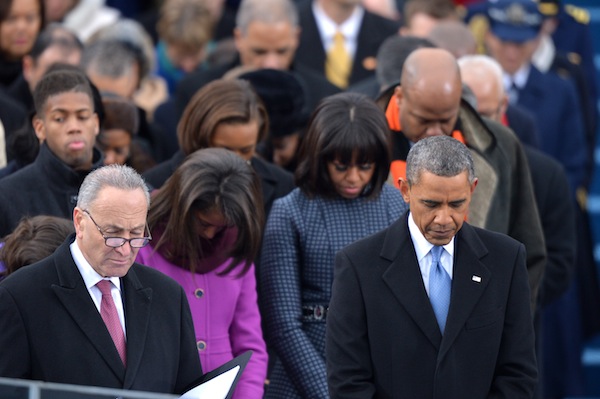Obama’s second inaugural address was probably one of the most left-wing speeches he has made since the Democratic primaries in 2008. It hit all the liberal notes, from women’s equality to climate change and gun control to welfare. But thanks to the President’s trademark combination of poetry and weight, it didn’t come off divisive or aggressive.
That’s because Obama pegged the political positions to principles that cut across partisan divide: chief amongst them, the second sentence of the Declaration of Independence: ‘We hold these truths to be self-evident, that all men are created equal, that they are endowed by their Creator with certain unalienable Rights, that among these are Life, Liberty and the pursuit of Happiness.’ Take, for example, his call for same-sex marriage: ‘if we are truly created equal, then surely the love we commit to one another must be equal, as well’.
And in the most beautifully-written section he wove that principle through the struggles for civil rights for women, African-Americans and gay people:
‘We the people declare today that the most evident of truth that all of us are created equal – is the star that guides us still; just as it guided our forebears through Seneca Falls and Selma and Stonewall; just as it guided all those men and women, sung and unsung, who left footprints along this great mall, to hear a preacher say that we cannot walk alone; to hear a King proclaim that our individual freedom is inextricably bound to the freedom of every soul on Earth.’
The speech wasn’t just pitched on equality – home turf for the left. Throughout the speech were instances of Obama reclaiming for the left a concept that has, of late, more often been claimed by the Tea Party: freedom. ‘Preserving our individual freedoms,’ he proclaimed, ‘ultimately requires collective action.’ And boldest of all, perhaps, was his defence of entitlement programmes as tools to free people:
‘The commitments we make to each other through Medicare and Medicaid and Social Security, these things do not sap our initiative. The strengthen us. They do not make us a nation of takers. They free us to take the risks that make this country great.’
But while affirming his commitment to liberty, he jetted individualism with a return to his ‘You didn’t build that’ refrain:
‘For the American people can no more meet the demands of today’s world be acting alone than American soldiers could have met the forces of fascism or communism with muskets and militias. No single person can train all the math and science teachers we’ll need to equip our children for the future. Or build the roads and networks and research labs that will bring new jobs and businesses to our shores.’
Above all, the speech was a call to action – the likes of which Obama specialised in during his 2008 campaign:
‘Today we continue a never-ending journey to bridge the meaning of those words with the realities of our time. For history tells us that while these truths may be self-evident, they’ve never been self-executing.’
Continuing that journey, Obama said, will involve equal pay for women, equal marriage for gay couples, reducing the queues at voting booths, reforming immigration and, of course, tackling gun violence:
‘Our journey is not complete until all our children, from the streets of Detroit to the hills of Appalachia to the quiet lanes of Newtown, know that they are cared for and cherished and always safe from harm.’
Those, then, will be the challenges Obama turns to in his second term – as well as climate change, which he touched on too. (‘We will respond to the threat of climate change, knowing that the failure to do so would betray our children and future generations.’) For more specifics, tune in to his State of the Union address on 12 February.






Comments